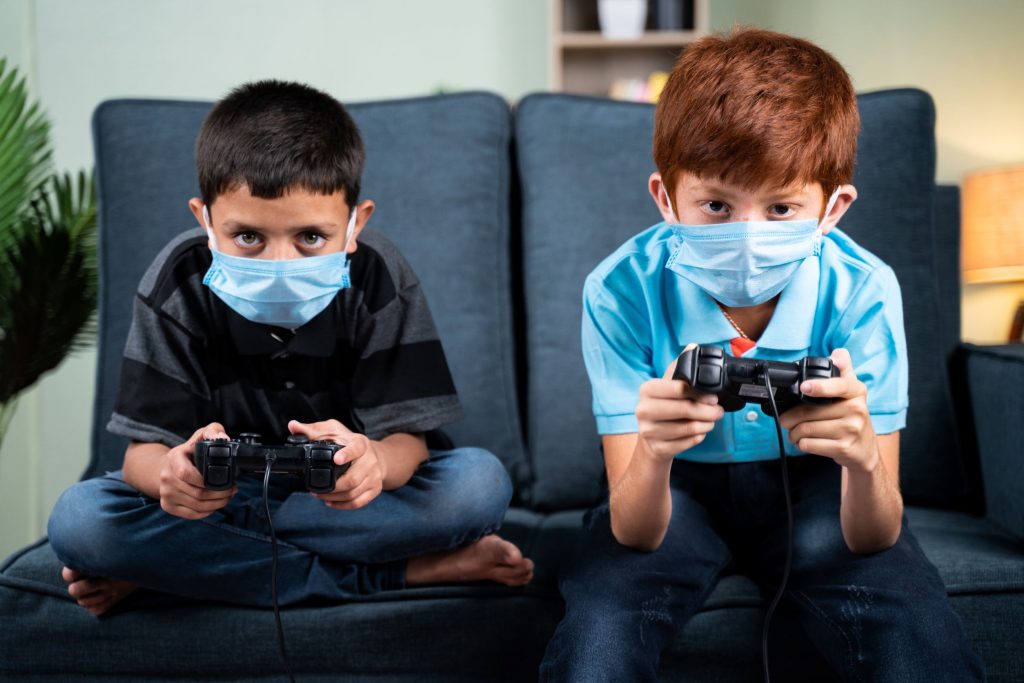
As if loss of income, social isolation and school closures weren’t enough, COVID-19 lockdowns were also responsible for a rise in compulsive disorders. The number of children and young adults receiving treatment for gaming addiction tripled during the height of the pandemic in 2020. One private hospital said the majority of enquiries came from parents concerned about their children’s addiction to technology (1). Was the reason for this rise in cases due to enforced national lockdowns? Does it simply correlate with an increased awareness of gaming disorders or were we already heading for a gaming addiction crisis?
At Delamere, we have been concerned by the rise in gaming addiction over the last few years and are ready to help those who may be struggling. We have a team of qualified experts who specialise in treating other addictions, such as internet, smartphone and gaming addiction, at our purpose-built retreat in Cheshire. Here, our psychotherapists discuss the impact of lockdown on addiction to computer games and online gaming, as well as how Delamere can help if you, or your child, is gaming too much.
Gaming addiction: how it all began
The first reports of gaming addiction didn’t appear in psychological and psychiatric literature until the 1980s, following the release of the earliest commercial video games. In 1983, two school counsellors described ‘video game addiction’ as a disorder like any other addiction, consisting of “a compulsive behavioural involvement, a lack of interest in other activities, association and friendship circles mainly with other video game addicts, and physical and mental symptoms when attempting to stop the behaviour” (2).
That was back in the time of Space Invaders and a lot has happened since. In the 1990s PC gaming overtook arcade games, and by the 2000s gaming had expanded online into mass multiplayer communities. Over the years, several studies have discussed the detrimental effects on young people’s minds and in 2018, The World Health Organisation finally acknowledged we had a problem. ‘Gaming disorder’, described as “a pattern of persistent or recurrent gaming behaviour so severe that it takes precedence over other life interests”, was listed as a mental health condition for the first time. Given that gaming addiction isn’t a new problem, can lockdowns during the pandemic really be held responsible?
The link between lockdown and gaming addiction
The COVID-19 pandemic forced everyone to physically distance themselves from others, whether through lockdowns or self-quarantine, and this has caused more people to turn to gaming to relieve psychological stress. One week after the first lockdown in March 2020, video game usage in the US went up 75% and game download volume reached an all-time high in Europe (3).
The social isolation, money problems and other stresses that came with lockdown forced many people to develop unhealthy habits and even return to past addictions. For people in active recovery for gaming addiction, lockdowns fuelled a relapse. Working from home provided the ideal environment for increased screen time away from prying eyes.
Children and young people have found it especially hard to cope with the disruption to their routines, home-schooling and shift in family dynamics caused by lockdown. Gaming had some positive effects, helping lost adolescents reconnect with friends and cope with the boredom of being stuck inside. But, at the same time, the rewarding and repetitive nature of multiplayer games led to a spike in gaming addiction.
Is my child gaming too much?
Gaming can be social, fun, creative and educational. But when children start to lose interest in other activities or develop an unhealthy obsession with getting their ‘fix’, it could be time to assess their gaming habits. The American Academy of Paediatrics says kids over six should have no more than 60 minutes of gameplay on school nights and no more than two hours on non-school days. Whereas children under six should spend closer to 30 minutes (4).
One web-based study involving parents in Italy found a correlation between the time children and adolescents spent gaming and gaming disorder symptoms. This was influenced by how much parents knew about their children’s lives, whether they monitored video game use and if the parents played video games themselves (4).
It’s good to know some of the common signs and symptoms of gaming addiction to make sure you can prevent an enjoyable pastime becoming a big problem. Be aware if your child constantly talks or thinks about gaming; is excessively angry or upset if gaming isn’t accessible; can’t stop when you ask them to; or gaming starts to interfere with other aspects of their life. Too much gaming can lead to sleep problems, friendship breakdowns and poor performance at school.
At Delamere, we have a team of expert psychotherapists that work with families to understand the reasons behind gaming addiction and develop strategies to overcome them in a safe and nurturing environment. If you recognise any of these warning signs in your own children, please ask for help.
How can I stop my child gaming too much?
It’s important to set healthy time limits on gaming from the start. Many tablets have built-in timers to help control screentime for younger players and, whilst it’s harder to keep tabs on teenagers, keeping consoles out of their bedrooms can help to keep gaming time in check. Try to monitor what they’re playing and perhaps suggest games that are less addictive, but still fun. Playing games as a family can also help to break the cycle of excessive solitary behaviour that comes with gaming addiction.
Remember, gaming addiction might not actually be the problem. It might be the symptom of something bigger going on in your child’s life. Perhaps they’re struggling with their friendship groups or schoolwork and using gaming as a means of escape. Get them to open up about why they enjoy gaming, rather than making it seem like a bad choice and find ways to compromise instead of banning games altogether.
How can Delamere help with gaming addiction?
If you think you might be addicted to playing computer games or your child is gaming too much, it’s important to ask for help. Delamere is one of the few purpose-built residential retreats in the UK to offer specialist support for gaming addiction. We have a team of holistic experts that can guide you through a successful recovery from our base in rural Cheshire.
We believe that everyone has a reason for their addiction and, as we’ve seen in recent years, the pandemic has had a big impact on mental health, especially among young people. Our focus is on helping you identify the cause of your addictive behaviour and learning how to cope with your triggers, whether that is loneliness, boredom, stress or otherwise.
We offer one-to-one therapy and group counselling sessions in safe and comfortable surroundings, where you can speak openly about your gaming addiction, without judgement. Every residential rehab programme is tailored to your individual needs and features a range of innovative therapeutic techniques and somatic healing experiences for a completely holistic approach to treatment. You will leave with a future-proof plan for long-lasting recovery from addiction.
References
2. Soper WB, Miller MJ. Junk time junkies: An emerging addiction among students. School Counsellor 1983; 31: 40-43.
3. Ko CH, Yen JY. Impact of COVID-19 on gaming disorder: Monitoring and prevention. J Behav Addict. 2020 Jun 6;9(2):187-189. doi: 10.1556/2006.2020.00040. PMID: 32634111.
4. Victor C. Strasburger et al. Children, Adolescents and the Media. Pediatrics (2013) 132 (5): 958–961.https://doi.org/10.1542/peds.2013-2656.
5. Donati MA, Guido CA, De Meo G, Spalice A, Sanson F, Beccari C, Primi C. Gaming among Children and Adolescents during the COVID-19 Lockdown: The Role of Parents in Time Spent on Video Games and Gaming Disorder Symptoms. Int J Environ Res Public Health. 2021.






